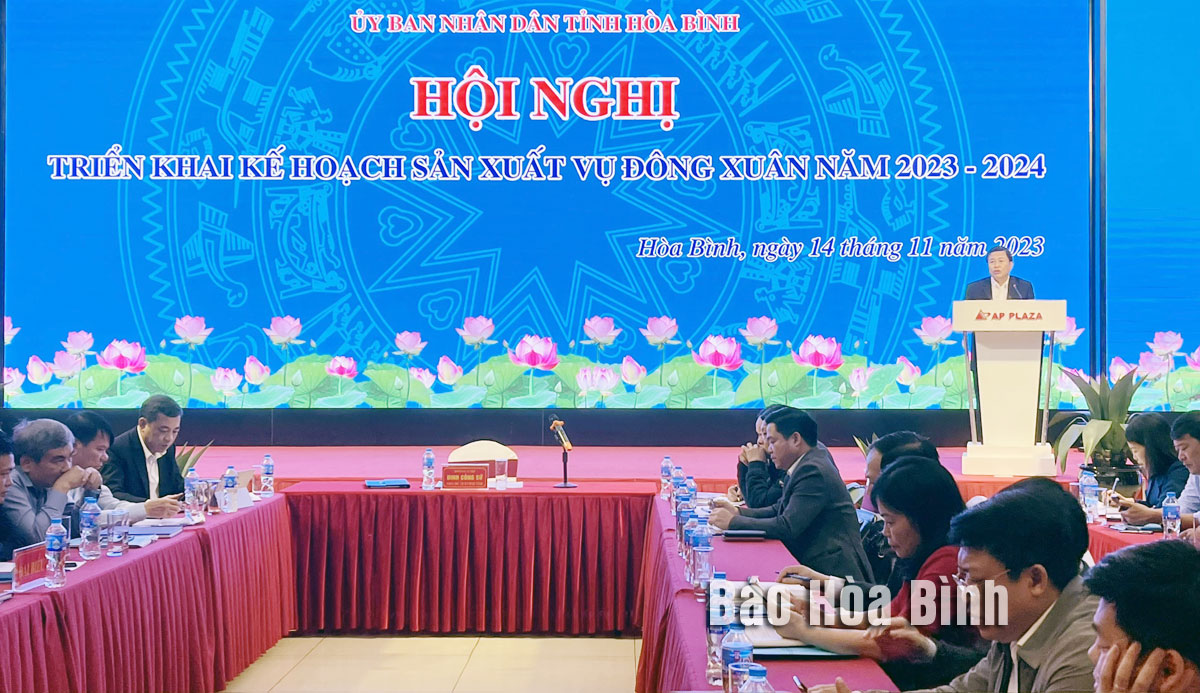
Vice Chairman of the provincial People’s Committee Dinh Cong Su on November 14 chaired a conference to discuss production plans for the 2023-2024 winter-spring crop.
Vice Chairman of the provincial
People’s Committee Dinh Cong Su speaks at the conference.
In this year's summer-autumn crop, production direction was carried out early
in the favourable weather condition, and diseases on crops, livestock, and
aquaculture are predicted and well controlled.
The annual planting area in the crop reached 46,500 ha, up 1.7% over the same
period last year, and 4.4% higher than the set plan. Localities across the
province planted 33,200 ha of grain crops, equivalent to 99.5% of the planned
target. Their annual output was estimated at 36,300 tonnes in the crop.
Value chain-based production links have been formed and they operate
effectively. Up to 2,500 ha of ineffective rice farming land was converted to
other crops. About 9.300 ha of forest have been planted, 67.6% higher than the
set plan. The locality’s forest coverage is maintained at 51.5%.
With 2.700 ha of water surface area for aquaculture, Hoa Binh’s annual aquatic
output is estimated at 12,200 tonnes. The locality exported over 19,900 tonnes
of farm produce and nearly 25,000 cu.m of furniture and plywood.
At the conference, delegates discussed and
analysed results achieved, clearly pointing out shortcomings and limitations to
be addressed in the upcoming summer-autumn crops. The province is set to cultivate 62,000 ha in the 2023 - 2024 spring crop,
including 31.400 ha of grain crops.
In his speech at the event, Vice Chairman of the provincial People’s Committee
Dinh Cong Su acknowledged and highly valued the results achieved in the
production of the2023 summer-autumn crop. He urged localities to work hard in the upcoming crop in order to achieve
comprehensive results in terms of area, productivity, output, and value of
agricultural products.
The People's Committees of Hoa Binh city and districts must carefully review to
set production targets and develop specific production plans, he said,
stressing the need to proactively convert ineffective rice-growing areas to
other crops, and encourage farmers to promote the application of science and
technology in production to increase the value of farm produce.
He added that attention must be paid to maintaining the number of cattle and
poultry herds, developing concentrated production and livestock farming in
farms in accordance with the locality’s master plan for socio-economic
development, and promoting intensive fish farming in cages and rafts on rivers
and lakes.
Hoa Binh province is undergoing a dynamic transformation amid Vietnam’s national digital transition. Building on Poliburo’s Resolution No. 57-NQ/TW on breakthroughs in science, technology, innovation, and national digital transformation, the province has rolled out a wide range of practical action plans. A standout initiative is the "Digital Literacy for All” movement, an effort to ensure that no one is left behind in the digital era.
Hoa Binh province is undergoing a dynamic transformation in the wake of the national digital transformation movement. Building on Resolution No. 57-NQ/TW of the Politburo on breakthroughs in science, technology, innovation, and national digital transformation, the province has implemented a wide range of practical action plans. A standout initiative is the "Digital Literacy for All” movement ambitious effort to ensure that no one is left behind in the digital age.
With a spirit of unity and proactive problem-solving, the Party Committee, the government and the people of Dong Lai Commune (Tan Lac District) have made great strides in implementing the resolutions of the 24th Party Congress of the commune for the 2020 - 2025 term. Focusing on leadership and practical actions, the commune has brought the Party’s resolutions into daily life, creating strong impacts and pushing the local development forward.
Amid the nationwide push for digital transformation, young people in Hoa Binh Province are stepping up as dynamic pioneers, applying technology to enhance Youth Union operations and expand the reach of youth-led initiatives. Through creativity and adaptability, Youth Union organizations at all levels have introduced a series of practical solutions, contributing to modern governance and community development.
In recent years, An Nghia commune, located in Lac Son district, has stepped up administrative reform, focusing on improving the quality and efficiency of its single-window service unit for receiving and processing administrative procedures. These improvements have helped create favourable conditions for local residents and organisations to handle administrative procedures, contributing to the commune’s broader socio-economic development.
The Prime Minister-approved master plan to develop the multi-use value of forests ecosystems through 2030, with a vision to 2050, aims to improve the management and sustainable use of forest resources, create jobs, increase incomes, and improve the living standards of ethnic minorities, people in mountainous and remote areas, forest workers and those living near forests.



